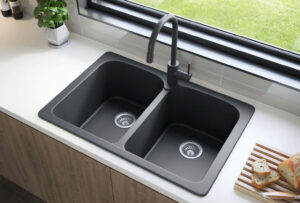Things to Know About Kitchen Sinks
The kitchen sink is one of the most frequently used features in any kitchen. It serves as a functional centerpiece for meal preparation, dishwashing, and general cleaning tasks. Choosing the right kitchen sink for your needs and understanding its features and options can significantly impact the efficiency and aesthetics of your kitchen. In this blog post, we will explore some essential things to know about kitchen sinks, helping you make an informed decision for your dream kitchen.
Sink Material Options
Kitchen sinks come in a variety of materials, each with its own unique advantages and characteristics. Some popular choices include stainless steel, granite composite, fireclay, cast iron, and porcelain. Stainless steel is durable, easy to clean, and resistant to stains, while granite composite sinks offer a modern and durable option. Fireclay and cast iron sinks provide a classic and elegant look, while porcelain sinks are known for their timeless beauty. Consider your kitchen style, durability needs, and maintenance preferences when selecting the sink material.
Sink Configurations
Kitchen sinks are available in various configurations, allowing you to choose one that suits your specific needs. Common configurations include single bowl, double bowl, and farmhouse/apron front sinks. Single bowl sinks offer a larger workspace and are ideal for those who handle larger pots and pans. Double bowl sinks provide the flexibility of multitasking, allowing you to separate tasks like washing dishes and food prep. Farmhouse sinks feature a front apron that adds a rustic and charming touch to your kitchen.
Size and Depth
The size and depth of the sink play a crucial role in its functionality. Consider the size of your kitchen and the tasks you typically perform. A deeper sink is beneficial for accommodating larger pots and pans and reducing splashing, while a shallow sink can be easier to reach and clean. Measure your cabinet space and ensure the sink you choose fits properly without sacrificing counter space.
Faucet Compatibility
When selecting a kitchen sink, it’s important to consider faucet compatibility. The number of faucet holes in the sink should align with the number of holes required by your chosen faucet. Additionally, ensure that the faucet’s spout height and reach will provide adequate clearance and functionality within the sink basin.
Maintenance and Durability
Consider the maintenance requirements and durability of the sink material. Stainless steel sinks are generally low maintenance, while composite sinks may require specific care instructions. Porcelain sinks are prone to chipping and require delicate handling. Assess your lifestyle and cleaning preferences to choose a sink that suits your needs.
Noise Reduction
If noise is a concern, consider sinks with built-in sound-dampening technology. Some sinks feature insulation coatings or pads that minimize noise caused by water flow and dishwashing activities. This feature can greatly enhance your overall kitchen experience, particularly in open-concept kitchen layouts.
Budget Considerations
Kitchen sinks are available in a wide price range, depending on the material, brand, and features. Determine your budget beforehand and consider the long-term investment value of the sink. Remember that a well-chosen, high-quality sink can last for many years and add value to your kitchen.
Professional Installation
While some homeowners may opt for a DIY approach, it’s often recommended to seek professional installation for your kitchen sink. Professional installers have the experience and tools to ensure a proper fit, secure mounting, and reliable plumbing connections.
Contact us for professional help! Check out our instagram account for updates.

